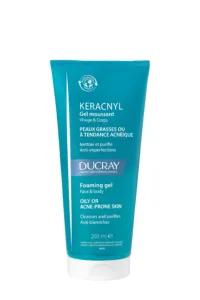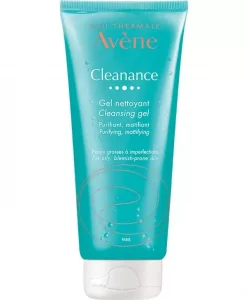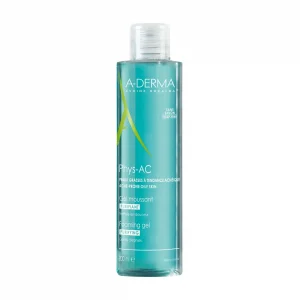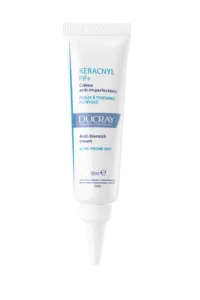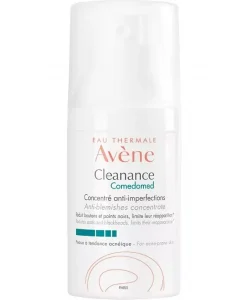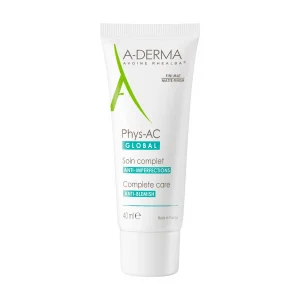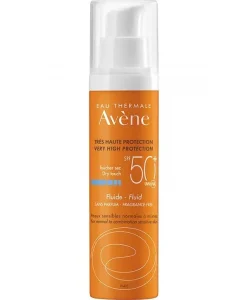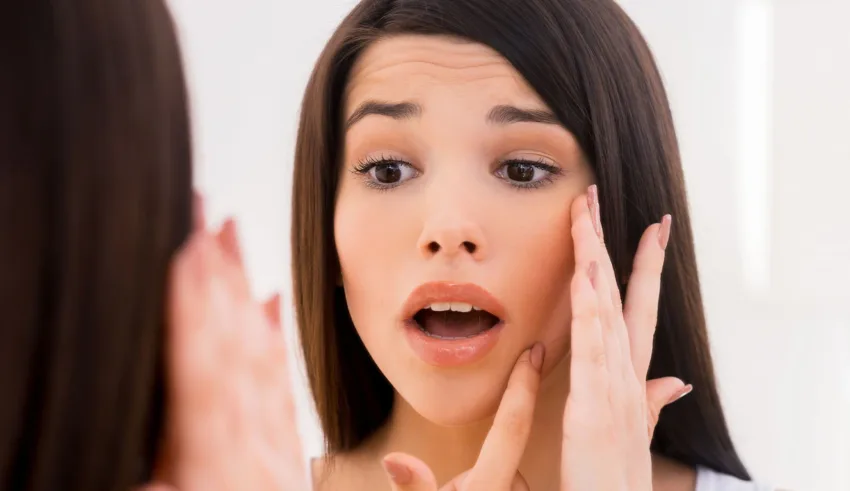
When most people talk about acne-prone skin, they probably think of a complexion covered in bright red pimples, but acne can manifest itself in many other ways. Although it’s a very common skin condition, many people don’t really know what acne is, which can make treating and preventing breakouts frustrating. The good news is that with a consistent treatment plan, you can achieve clearer skin.
We spoke with the dermatologist Dr. Omnia Khater to find out what acne is, how it forms, and what you can do about it.
What is acne-prone skin?
According to Dr. Omnia Khater, acne-prone skin develops comedones and pimples. It is often oily and mixed. This is because the sebaceous glands produce more sebum than in other skin types. She explains that acne has three causes:
- Hyperactivity of the sebaceous glands
- Abnormal excretion of dead skin cells
- A rapid production (or proliferation) of Cutibacterium acnes, a bacterium responsible for acne.
Acne is a non-contagious skin condition that is most common in teenagers, but symptoms can persist into adulthood, and some people, especially women, experience symptoms for the first time after age 25.
Acne usually appears on the face, neck, shoulders, chest, and back and varies in severity from mild to moderate to severe. It does not only affects people’s skin, but it also impacts their quality of life. The symptoms can be stressful and cause self-confidence issues.
What triggers skin blemishes?
Here are the main factors causing acne:
1- Genetics
Genes determine our skin type and some of us have more reactive skin, more prone to inflammation, blemishes, and acne than others. If both your parents had acne, you are more likely to develop this condition.
2- Hormones
Acne is a hormonal disease. Hormones are responsible for the development of sebaceous glands and stimulate sebum production in these glands.
Increased hormone levels during puberty are the main reason why acne is more common in adolescence, but hormones continue to affect men and women at different stages of life.
3- Medications
Some medications – like steroids and lithium – can cause acne.
4- Diet
A diet with a high glycemic index and lots of dairy products can trigger or exacerbate acne.
5- Stress
Stress can trigger hormones that, in turn, stimulate sebum production and exacerbate acne.
6- Smoking
Research shows that smoking exacerbates acne by causing oxidative stress to the skin and changing the composition of sebum.
7- Unsuitable skin care products
Harsh soap-based cleansers and water that is too hot can disrupt the skin’s natural balance and exacerbate symptoms. Some skin care and makeup products are also comedogenic, meaning they clog pores and cause acne.
What can I do to reduce blemishes and care for my skin?
Skin with blemishes benefits from special care:
1- Cleanse
Cleanse your skin twice a day and care for it with products specially formulated to meet your skin’s particular needs. It is recommended to wash your face in the morning and before going to bed.
Gentle cleansers help reduce any irritation that may occur with acne treatments. To remove dead skin cells, consider using an exfoliating cleanser once or twice a week.
Below are 3 acne cleansers that should help even the most sensitive acne-prone skin!
Ducray Keracnyl Foaming Gel
Eau Thermale Avène Cleanance Cleansing Gel
A-Derma Phys-AC Foaming Gel
2- Look for the right active ingredients
The active ingredients you choose depend on the type of acne you have and your skin type. In general, we recommend acne treatments that contain one of the following four active ingredients:
- Benzoyl peroxide
- Salicylic acid
- Adapalene
- Retinol
Each of these ingredients dries the skin and helps prevent acne from forming.
Find out below 3 acne spot treatments that will clear up your skin.
Ducray Keracnyl PP+ Anti-Blemish Soothing Cream
Eau Thermale Avène Cleanance Comedomed
A-Derma Phys-AC Global
3- Moisturize
Acne treatments are drying, so it’s essential to keep skin hydrated and support the skin’s natural barrier. Just be sure to choose a moisturizer for acne-prone skin that is non-comedogenic and non-greasy, which means it won’t clog pores or promote acne formation.
4- Wear SPF
The best thing you can do for your skin – whether you have acne or not – is to wear an oil-free, broad-spectrum sunscreen daily. Wearing sunscreen for acne-prone skin is especially important if you’re treating acne because ingredients like retinol, benzoyl peroxide, and salicylic acid make your skin more sensitive to the sun. Sunscreen also helps reduce any redness or dark spots that may remain after acne has healed.
We recommend the following sunscreen which is suitable for acne-prone skin:
Eau Thermale Avène Very High Protection Fluid SPF 50+
5- Don’t over-exfoliate
While it’s tempting to try to clear up acne, excessive exfoliation can strip the skin of its natural oils, aggravate irritation, and make breakouts worse.
6- Don’t expect to see immediate results
You won’t see noticeable changes with a new product for at least six to eight weeks. Don’t give up too quickly!
7- Don’t wear too much makeup
Makeup can clog pores and cause acne, especially if it is oil-based and heavy. These products also prevent your skin from breathing. Dr. Omnia Khater suggests not wearing foundation, powder, or blush during a breakout.
8- Don’t pop your pimples
Dr. Omnia Khater warns against popping pimples. A pimple is an indication that oil, sebum, and bacteria are trapped.
In addition to making a small pimple look worse, scratching or popping it can prolong healing time and increase the risk of scarring.
What vitamins are good for acne-prone skin?
Vitamins and minerals can help rebalance hormone levels, fight acne and achieve clearer skin. Dr. Omnia Khater states that the vitamins that are good for acne are zinc, omega 3, vitamin E, probiotics, prebiotics, and vitamin A.
- Zinc
Zinc decreases oil production in the skin, which reduces the risk of bacterial growth and clogged pores.
- Omega 3
Omega-3 fatty acids, particularly EPA and DHA, have anti-inflammatory effects. So, it’s believed that they can indirectly fight acne by targeting inflammation
- Vitamin E
Vitamin E is largely used as an anti-inflammatory and antioxidant. The fat-soluble properties of vitamin E allow for quick absorption into the skin. The faster it is absorbed; the faster acne can heal. Vitamin E helps the skin retain moisture and promotes collagen production.
- Probiotics and prebiotics
Studies have shown that probiotics and prebiotics can help reduce acne lesions and repair skin barriers of acne sufferers.
- Vitamin A
Vitamin A is an antioxidant and fights free radicals, which can cause cell damage and lead to premature skin aging. Vitamin A also decreases inflammation, promotes new skin cell growth, and protects against environmental damage.

